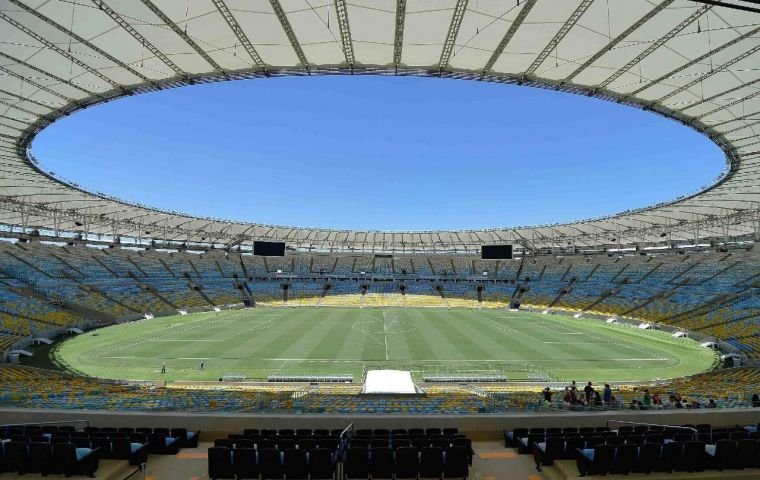MercoPress. South Atlantic News Agency
Rio de Janeiro lawmakers now against renaming Maracana stadium after Pele to focus on covid-19 fight
 “Maracana will be eternally called Maracana,” Ceciliano said.
“Maracana will be eternally called Maracana,” Ceciliano said. The Legislative Assembly of the Brazilian state of Rio de Janeiro (Alert) Tuesday decided to go back on its steps and drop the initiative to rename the iconic Maracana stadium after football legend Pelé.
The name change sparked controversy in Brazil, which is experiencing the worst moment of the pandemic, with records of deaths and hospitals on the brink of collapse.
The author of the initiative and Assembly Speaker André Ceciliano (Workers' Party, left), asked Interim Governor Claudio Castro to veto it due to the uneasiness it generated and considering that the authorities should focus on fighting the pandemic of coronavirus.
“With the backing of the leaders [of the Assembly], I will send the government the request for a veto of the project,” Ceciliano said in a meeting with the deputies, who supported his new request. “I intended to pay tribute to our king of soccer, athlete of the century, the best player of all time,” explained Ceciliano.
The Alert approved on March 9 to change the official name of the venue to “Edson Arantes do Nascimento-Rei Pelé”, the full name and nickname of the only footballer three times world champion (1958, 1962 and 1970).
“The truth, the Maracana will be eternally called Maracana,” Ceciliano added as Castro's veto is taken for granted, according to local media. The current official name of the stadium is “Jornalista Mario Filho,” in honour of a legendary journalist and sports writer. But it is known simply as Maracaná, after the name of the Rio de Janeiro neighbourhood where it is located.
The stadium has been the site of historic matches, including the 1950 and 2014 World Cup finals, and the opening and closing ceremonies of the 2016 Olympic Games.
Home to Fluminense and two-time Brazilian champion Flamengo, the imposing 78,000-seat sports arena, is also fraught with trauma for Brazilians. It opened in 1950 for that year's World Cup, hosting Brazil's heartbreaking 2-1 loss to Uruguay in the final, an event that is still sadly remembered as the “Maracanazo.” Pelé, 80, is credited with restoring Brazil's soccer pride after that debacle.
The proposed name change would stick to the football arena, while the sports complex, which includes the Maracanãzinho gym and the Célio de Barros athletics stadium, would remain “Mario Filho.”
Historians and relatives of Filho's never agreed with the change. Even the Public Ministry of the territory suggested frustrating the initiative, even more so when the name of the stadium “integrates the cultural identity of Rio” and the measure would violate the intangible heritage of the fans.
The Maracana was opened under the official name of Estadio Municipal Mendes de Moraes, in honour of the mayor of Rio at the time. But as the politician's prestige waned out, it was renamed when Filho passed away in 1966, when Brazil had already won two world cups.




Top Comments
Disclaimer & comment rulesCommenting for this story is now closed.
If you have a Facebook account, become a fan and comment on our Facebook Page!